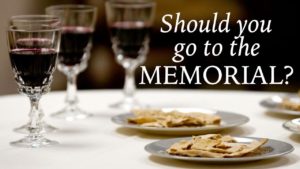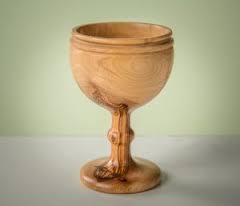 It’s known by different names in different traditions; the Lord’s Table, the Lord’s Supper, the Eucharist, the Breaking of Bread, Holy Communion. Mormons call it ‘the sacrament’ which seems strange since it is a sacrament. Even in Mormonism, however, it isn’t the only sacrament since they also have baptism, as well as rituals of anointing. In my church we call it communion and I regard it as very precious. I was interested, then, in what the Jehovah’s Witnesses do with it, how they regard it.
It’s known by different names in different traditions; the Lord’s Table, the Lord’s Supper, the Eucharist, the Breaking of Bread, Holy Communion. Mormons call it ‘the sacrament’ which seems strange since it is a sacrament. Even in Mormonism, however, it isn’t the only sacrament since they also have baptism, as well as rituals of anointing. In my church we call it communion and I regard it as very precious. I was interested, then, in what the Jehovah’s Witnesses do with it, how they regard it.
To Jehovah’s Witnesses it is a ‘Memorial Meal’ and, while Christian churches celebrate this sacrament frequently, Witnesses mark it annually, on the Jewish Passover which, in 2017, will be Tuesday 11 April. My wife and I went to one of these celebrations once and saw that when the elements were passed around no one partook. This is because only the 144,000 are regarded as having a heavenly hope and, therefore, only they can partake. But that is not the only thing that is puzzling about this peculiar practice of the Jehovah’s Witnesses.
The Lord’s Supper
‘But in the following instructions I do not commend you, because when you come together it is not for the better but for the worse. For, in the first place, when you come together as a church, I hear that there are divisions among you. And I believe it in part, for there must be factions among you in order that those who are genuine among you may be recognised.
When you come together, it is not the Lord’s supper that you eat. For in eating, each one goes ahead with his own meal. One goes hungry, another gets drunk. What! Do you not have houses to eat and drink in? Or do you despise the church of God and humiliate those who have nothing? What shall I say to you? Shall I commend you in this? No, I will not.
For I received from the Lord what I also delivered to you, that the Lord Jesus on the night when he was betrayed took bread, and when he had given thanks, he broke it, and said, “This is my body which is for you. Do this in remembrance of me.”
In the same way also he took the cup, after supper, saying, “This cup is the new covenant in my blood. Do this, as often as you drink it, in remembrance of me.”
For as often as you eat this bread and drink the cup, you proclaim the Lord’s death until he comes.’ (1 Corinthians 11:17-26, ESV)
There are three things we learn here:
-
This ‘meal’ was eaten ‘when you come together as a church.’ Paul writes, ‘as often as you eat…and drink..’ so this was a frequent occurrence, something that happened when the church met. It appears it was also a meal in which overeating and even drunkenness were a possibility, the reasons for Paul’s chastisement of the Corinthian believers.
-
From earliest times it was known as ‘the Lord’s Supper’ and this will become significant for us later.
-
It is a memorial meal to, ‘proclaim the Lord’s death until he comes.’
It would seem that an annual memorial is not in view here and nor is the idea that only an elite partook.
Whose Cup?
 In the previous chapter Paul deals with the question of idolatry. Writing about food sacrificed to demons, he warns Christians in Corinth that they cannot participate in the body of Christ and participate in demons. He reminds us that the cup is the cup of Christ:
In the previous chapter Paul deals with the question of idolatry. Writing about food sacrificed to demons, he warns Christians in Corinth that they cannot participate in the body of Christ and participate in demons. He reminds us that the cup is the cup of Christ:
‘The cup of blessing that we bless, is it not a participation in the blood of Christ? The bread that we break, is it not a participation in the body of Christ? Because there is one bread, we who are many are one body, for we all partake of the one bread.’ (1 Corinthians 10:16-17, ESV)
The New World Translation has the same wording.
Further on in the chapter we read:
‘…what pagans sacrifice they offer to demons and not to God. I do not want you to be participants with demons. You cannot drink the cup of the Lord and the cup of demons. You cannot partake of the table of the Lord and the table of demons.’ (vv 20-21, ESV)
The New World Translation, however, reads:
‘what the nations sacrifice, they sacrifice to demons and not to God; and I do not want you to become sharers with the demons. You cannot be drinking the cup of Jehovah and the cup of demons; you cannot be partaking of “the table of Jehovah” and the table of demons.’
The cup of the Lord has become the cup of Jehovah, the table of the Lord the table of Jehovah where, in vv 16-17, the blood in the cup was the cup of Christ, the bread on the table the body of Christ. In the Kingdom Interlinear they appear to want to have it both ways. In the Greek they correctly translate ‘cup of Lord..table of Lord’ while the text gives us ‘Jehovah.’ Of course, verse 20 clearly references God, a direct comparison is made between demons and God, and Jesus cannot be God in their thinking so ‘the Lord’ must become ‘Jehovah.’
However, when we go back to that familiar passage in 1 Corinthians 11 we read:
‘For whenever you eat this loaf and drink this cup, you keep proclaiming the death of the Lord, until he comes. Therefore, whoever eats the loaf or drinks the cup of the Lord unworthily will be guilty respecting the body and the blood of the Lord.’ (1 Cor.11:26-27, NWT)
It has become ‘the cup of the Lord’ again. It is embarrassingly obvious that the text has been tampered with in just those verses to suit Jehovah’s Witness doctrine. of course, most will not be so surprised by this but look at what they have done.
Who is the Lord whose death is proclaimed? Jesus. Whose cup is it? The Lord’s. Who is the Lord? Jesus, of course.
They have unwittingly made a case for identifying Jesus with Jehovah. They might have been better off leaving well alone.
…Until He Comes.
One final question. How long will Christians participate in this cup, eat at this table we call by different names? ‘…until he comes.’ But according to Witness teaching Christ returned invisibly in 1914. There are two questions we might ask Jehovah’s Witnesses as April 11th approaches, and in the days following:
Whose cup is passed around Kingdom Halls around the world? The cup of Christ, or the cup of Jehovah?
Why, if Jesus returned in 1914, are you having a memorial meal at all?

